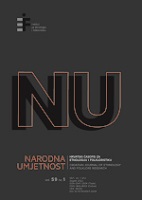“Neka sam ja sovjetska krhotina… Ali i to je bolje nego kupi-prodaj… Kupi…”: o knjizi Rabljeno doba (kraj crvenog čovjeka) Svetlane Aleksievič
“I may be a chunk of sovok… But it’s better than all this buying and selling…”: On Secondhand Time. The Last of the Soviets by Svetlana Alexievich
Author(s): Danijela Lugarić VukasSubject(s): Russian Literature, Social Theory, History of Communism, Sociology of Literature
Published by: Institut za etnologiju i folkloristiku
Keywords: Svetlana Alexievich; documentary prose; memory; affective economy; moral economy;
Summary/Abstract: This article aims to analyze the testimonies of women and men whose lives can be succinctly described as childhood and youth in socialism, and adulthood in capitalism, which Nobel prize laureate Svetlana Alexievich collected and published in one of her most popular books, Secondhand Time: The Last of the Soviets (2016) [Vremja sekond hènd (konets krasnogo cheloveka), 2013]. The paper analyzes how materiality – money in the most literal sense as a “root metaphor” (Shell 1995) and other objects of consumption – is used by her interlocutors to see, present, and interpret the social and political transition. Building on Maurice Halbwachs’s research on the social framework of memory and Pierre Nora’s and Jan Assmann’s research on the past as continually reorganized by the constantly changing frames of reference of the ever-evolving present, I argue that for Alexievich’s interlocutors, the experience of transition and capitalist modernity is crucial for the way they imagine and understand the Soviet socialist past. Secondhand Time offers an account of the affective life of capitalism in post-Soviet everyday life, from which it is possible to derive its moral economy. In the second part of the paper, I critically approach Svetlana Alexievich’s authorial voice (visible at different levels in her works), showing that it often stigmatizes the experience of her interlocutors, which is especially evident in her treatment of nostalgia for the Soviet past, which imposes a moral economy that does not arise from the affects expressed in the testimonies.
Journal: Narodna umjetnost - Hrvatski časopis za etnologiju i folkloristiku
- Issue Year: 59/2022
- Issue No: 1
- Page Range: 87-103
- Page Count: 17
- Language: Croatian

